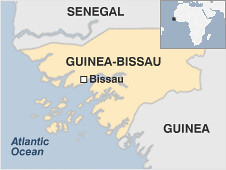
A map of the west African nation of Guinea-Bissau where the president and the head of the military were killed on March 1 and 2, 2009.
Originally uploaded by Pan-African News Wire File Photos
ABUJA--Guinea-Bissau risks sliding into anarchy unless a security solution, including taming the military, is found in the coup-prone west African nation, a regional leader warned yesterday.
Nigeria’s President Goodluck Jonathan, current chair of the Economic Community of West African States, said last year’s murder of president Joao Bernardo Vieira raised even more worries about the military involvement in the politics of Guinea-Bissau.
"This incident was the climax of a culture of impunity that had become a prevalent feature of the Guinea-Bissau politics," Jonathan said on the first day of a summit here.
Despite democratic elections to pick Vieira’s successor, "it is regrettable to say that the security situation in Guinea-Bissau has remained tenuous with the consequence of degenerating into a state of anarchy," Jonathan told fellow leaders.
"Guinea-Bissau should not bear the burden alone, it can only surmount its problems of instability and economic challenges with our active support," said Jonathan.
In April this year the then deputy army chief, General Antonio Indjai, led a mutiny, arresting and threatening to kill Prime Minister Carlos Gomes Junior and ousting his own boss.
The government has asked for a 600-strong foreign force to help restore stability in the poverty-stricken country, now an international drug trafficking hub.
Jonathan said ECOWAS is capable of deploying the requested troops to the small country blighted by military coups for nearly four decades.
But he warned, "It is believed that this force will be successful only if linked with the security sector reforms which looms large in the comprehensive efforts to assist Guinea-Bissau".
Defence chiefs from the region last month recommended sweeping reforms of the armed forces.
Guinea-Bissau’s history has been studded since independence from Portugal in 1974 with coups d’etat, army mutinies and political murders.Apart from the host, other leaders at the talks are the presidents of Senegal, Cape Verde, Guinea-Bissau and the vice president of Liberia.
The rest of the countries in the 15-member grouping are represented by ministers.
No comments:
Post a Comment